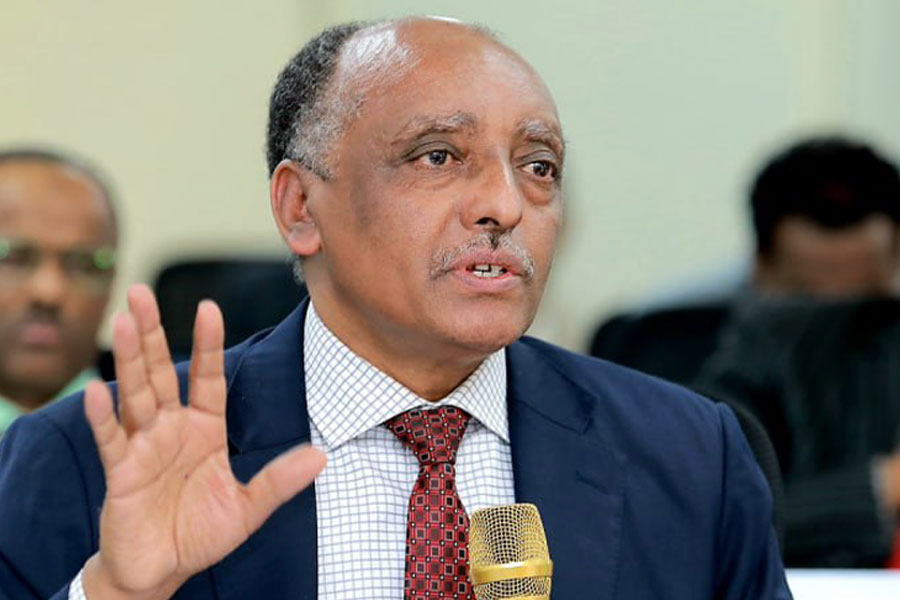
Fortune News | Jun 03,2023
Sep 10 , 2022
By Asseged G. Medhin
The government is finally opening the financial sector, making a long-awaited decision. The private sector must rise to the challenge, writes Asseged Gebremedhin, an insurance professional with over a decade of experience in finance.
The Council of Ministers recently approved a policy bill to open up the financial sector, laying the groundwork for Prime Minister Abiy Ahmed’s (PhD) promises to modernise the economy. The decision is historical, considering how long Ethiopia has been locked away from global capital. But, for anyone that looks back at historical records, it is clear that foreign financial institutions are not new to Ethiopia.
Modern banking and insurance services, which were introduced in Ethiopia by Europeans, trace their origin as far back as 1905, when the Bank of Abyssinia began to transact fire and marine insurance as an agent of a foreign insurance company. Half a century later, nine insurance companies were providing insurance services. Nothing underlines how progressive policies were back then that, except the Imperial Insurance Company, which was established in 1951, the rest of the insurance firms were branches or agents of foreign companies.
The number of insurance companies increased significantly and reached 33 in 1960. At that time, the insurance business was classified as trade and was administered by the provisions of the Commercial Code. This was the only legislation in force in respect of insurance except for a maritime code, which also governed marine insurance. The minimum paid-up capital required to establish an insurance company was as little as 12,500 Br. There was no restriction on foreign insurers.
The first remarkable event that the Ethiopian insurance market witnessed was the promulgation of a proclamation in 1970. This proclamation was issued to provide for the control and regulation of insurance businesses in Ethiopia. It created an Insurance Council and an Insurance Controller’s Office. The latter licensed 15 domestic insurance companies, 36 agents, seven brokers, three actuaries and 11 assessors in accordance with the provisions of the proclamation immediately in the year after the issuance of the law.
The law required an insurer to be a domestic company whose share capital (fully subscribed) is no less than 400,000 Br for a general insurance business, 600,000 Br for long-term insurance business, and a million Birr for firms engaging in both. Non-Ethiopian nationals were not barred from participating in the insurance business. The proclamation defined ‘domestic company’ as a share company having its head office in Ethiopia and with between 30pc and 51pc of its paid-up capital held by nationals or domestic companies, depending on the type of insurance business.
Unfortunately, this did not last for long and the insurance sector was unable to mature. Four years after the enactment of the proclamation, the Dergue came to power in 1974 and put an end to most forms of private ownership by introducing a command economy. All insurance companies were nationalised. From 1975 onwards, the government took over the ownership and control of these companies and merged them into a single unit called Ethiopian Insurance Corporation (EIC). It was the single insurance operator for the next two decades.
Following the change in the political economy in the 1990s, a proclamation for insurance business licensing and supervision heralded the beginning of a new era. Immediately after the enactment of the proclamation, private insurance companies began to flourish. Currently, there are 16 private, a single state-owned and one re-insurer firm. But foreign firms were not allowed, and meaningful competition did not come about to lead to the maturing of the industry. It has been the same for the banking industry.
The administration is now opening the financial sector to foreign investment. It will challenge Ethiopian financial institutions in all aspects. Board members, CEOs, executives, policymakers and regulators will have their work cut out for them in terms of developing strategy, vision, operation methods, governance, human power requirements and marketing strategies. As Ethiopia is a large market with a young population and a largely untapped population, it will be the choice of investors.
If we want to lead East Africa and play a leading role in the African Union’s Agenda 2060, the time is now. Regional integration and world-class insurers and bankers are non-negotiable. Let us ready ourselves to cope with the transforming financial sector where knowledge and technology are the pillars the service than networking and favoritism. The government is finally opening the way and showing the path forward. The ball is in the private sector’s court.
PUBLISHED ON
Sep 10,2022 [ VOL
23 , NO
1167]


Fortune News | Jun 03,2023

Fortune News | Feb 09,2019

Radar | Dec 04,2022

Commentaries | Apr 06,2024

Viewpoints | Apr 30,2021

Fortune News | Aug 18,2024

Featured | Jan 05,2019

Radar | May 27,2023

Radar | Oct 23,2021

Radar | Dec 26,2020

Photo Gallery | 175053 Views | May 06,2019

Photo Gallery | 165278 Views | Apr 26,2019

Photo Gallery | 155559 Views | Oct 06,2021

My Opinion | 136768 Views | Aug 14,2021

Dec 22 , 2024 . By TIZITA SHEWAFERAW
Charged with transforming colossal state-owned enterprises into modern and competitiv...

Aug 18 , 2024 . By AKSAH ITALO
Although predictable Yonas Zerihun's job in the ride-hailing service is not immune to...

Jul 28 , 2024 . By TIZITA SHEWAFERAW
Unhabitual, perhaps too many, Samuel Gebreyohannes, 38, used to occasionally enjoy a couple of beers at breakfast. However, he recently swit...

Jul 13 , 2024 . By AKSAH ITALO
Investors who rely on tractors, trucks, and field vehicles for commuting, transporting commodities, and f...

Oct 18 , 2025
The political establishment, notably the ruling party and its top brass, has become p...

Oct 11 , 2025
Ladislas Farago, a roving Associated Press (AP) correspondent, arrived in Ethiopia in...

Oct 4 , 2025
Eyob Tekalegn (PhD) had been in the Governor's chair for only weeks when, on Septembe...

Sep 27 , 2025
Four years into an experiment with “shock therapy” in education, the national moo...

Oct 18 , 2025 . By NAHOM AYELE
In a sweeping reform that upends nearly a decade of uniform health insurance contribu...

Oct 18 , 2025 . By BEZAWIT HULUAGER
A bill that could transform the nutritional state sits in a limbo, even as the countr...

Oct 18 , 2025 . By SURAFEL MULUGETA
A long-planned directive to curb carbon emissions from fossil-fuel-powered vehicles h...

Oct 18 , 2025 . By BEZAWIT HULUAGER
Transaction advisors working with companies that hold over a quarter of a billion Bir...